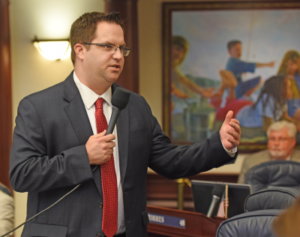
Some of the debate so far has bogged down in the usual traditional-versus-charter talking points (a sampling of which aired during a Capitol press conference).
But this afternoon, supporters of the plan faced a different question: Can it work?
HB 5105 would speed up the timetable for districts to turn around D- and F-rated struggling schools. If schools failed to shake their low ratings, districts would have to field applications from interested “hope operators” — charter school organizations with track records of raising student achievement in disadvantaged communities.
A new grant program would help those schools pay for startup costs. A revolving loan program would help them fund facilities.
The plan’s supporters have conceded it won’t change struggling students’ trajectories overnight.
But its critics have sounded new notes of skepticism.
Today on the House floor, they questioned whether even the best charter schools can meaningfully raise student achievement. (The research on this question is mixed, but studies have found operators like KIPP can make a significant positive difference among disadvantaged students.) Seizing on a Politico Florida article, skeptics asked whether well-regarded national operators would even want to come to Florida.
“If we’re going to put $200 million into this operation, with startup costs, what guarantees do we have that they’re going to succeed?” asked Rep. Robert Asencio, D-Miami.
Many of the charter school operators targeted by the bill have told the media they don’t have plans to come to Florida, or don’t do turnaround work focused on neighborhood schools.
Some of the nation’s top charter school operators have backed away from turnaround efforts in other states that didn’t have the element of parental choice.
But rhetoric has obscured an important distinction here. While the House bill contemplates charter school conversions and charter school recruitment, Schools of Hope would not be asked to turn around neighborhood schools “in place.” They would operate charter schools that target students who currently attend persistently struggling schools. Districts could keep their existing struggling schools open, at least until they exhausted other turnaround options.
Rep. Chris Latvala, R-Clearwater and sponsor of the bill, said the proposal is designed to eliminate barriers that have kept top charter school operators out of Florida. Those range from school board politics (Schools of Hope would have a streamlined charter application process) to funding equity, facilities and teacher recruitment (where the new grant program is supposed to help).
There’s a chance the schools will succeed, Latvala argued, and in schools that have languished with low achievement for years on end, Florida has to make bigger changes.
“These charter school operators that this bill is intending to attract have shown success in perpetually impoverished areas,” he said. “What harm is it to try something new, if what we’ve tried year after year has not worked?”
The House’s vote Thursday would put the measure on the table for budget negotiations with the Senate, which hasn’t yet heard the concept.
Senate President Joe Negron told reporters the upper chamber supports parental choice in education and had seen persuasive results from charter school operators like KIPP.
But he noted the Senate has education priorities of its own that would figure prominently in spending talks before the legislative session ends May 5.
“I think it’s something that we want to be supportive of,” he said of Schools of Hope.



Ah yes, the “Schools of Hope” juxtaposed to the “Schools of Languishing Failure” I’m sure with all their hopey changey stuff they can finally make our educational system great again.
You know what would be fun, if instead of spending huge amounts on a whole new school, if we created a way to carve out cutting edge programs in the already existing school infrastructure where students could get different educational styles and approaches without wasting massive dollar amounts on just building a new thing.
But then it wouldn’t be a “School of Hope” though, and how could we employ all the “Hope Operators” who are trying to help our children, but just don’t have the building to do it in yet.